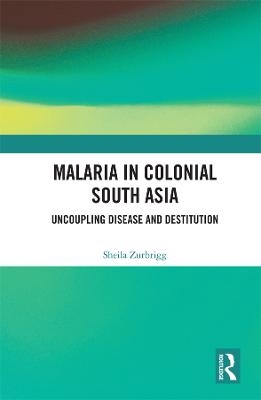
Malaria in Colonial South Asia
Routledge India (Verlag)
978-0-367-27214-2 (ISBN)
This book highlights the role of acute hunger in malaria lethality in colonial South Asia and investigates how this understanding came to be lost in modern medical, epidemic, and historiographic thought.
Using the case studies of colonial Punjab, Sri Lanka, and Bengal, it traces the loss of fundamental concepts and language of hunger in the inter-war period with the reductive application of the new specialisms of nutritional science and immunology, and a parallel loss of the distinction between infection (transmission) and morbid disease. The study locates the final demise of the ‘Human Factor’ (hunger) in malaria history within pre- and early post-WW2 international health institutions – the International Health Division of the Rockefeller Foundation and the nascent WHO’s Expert Committee on Malaria. It examines the implications of this epistemic shift for interpreting South Asian health history, and reclaims a broader understanding of common endemic infection (endemiology) as a prime driver, in the context of subsistence precarity, of epidemic mortality history and demographic change.
This book will be useful to scholars and researchers of public health, social medicine and social epidemiology, imperial history, epidemic and demographic history, history of medicine, medical sociology, and sociology.
Sheila Zurbrigg is a physician and independent scholar based in Toronto, Canada. Her health history research investigates rising life expectancy in South Asian history in relation to food security. She has served as Short-Term Epidemiologist for the World Health Organization, Smallpox Eradication Program, Uttar Pradesh, and Coordinator, Village Health Worker Program, Madurai, Tamil Nadu, India. She has held appointments as Adjunct Professor, International Development Studies, Dalhousie University, Halifax, Nova Scotia, Canada; Visiting Scholar, York University, Toronto, Canada; and Visiting Scholar, Jawaharlal Nehru University, New Delhi, India. Her work with traditional village midwives in rural Tamil Nadu (1975–1979) led to the analysis of child survival in contemporary India in relation to food security and conditions of women’s work. In 1985, she turned to South Asian health history research, funded by the Social Sciences and Humanities Research Council (Ottawa). Among her published work is the book Epidemic Malaria and Hunger in Colonial Punjab: 'Weakened by Want' (2019).
Introduction 1. The ‘Human Factor’ Transformed 2. The 1934-35 Ceylon Epidemic and its Epistemic Aftermath 3. Hunger Eclipsed: Nutritional Science in Colonial South Asia 4. The Larger Sanitationist Context 5. Colonial Retrenchment and ‘Selling’ Vector Control 6. Malaria and the W.H.O.: The ‘Human Factor’ Set Aside 7. Allure and Legacies of the Germ Paradigm 8. What Was Lost. Appendix I: Malaria Transmission in Punjab. Appendix II: An Epidemiological Approach to Hunger in History. Bibliography. Index
| Erscheinungsdatum | 18.09.2019 |
|---|---|
| Zusatzinfo | 4 Tables, black and white; 1 Line drawings, black and white; 5 Halftones, black and white; 6 Illustrations, black and white |
| Verlagsort | London |
| Sprache | englisch |
| Maße | 156 x 234 mm |
| Gewicht | 453 g |
| Themenwelt | Geschichte ► Teilgebiete der Geschichte ► Kulturgeschichte |
| Geschichte ► Teilgebiete der Geschichte ► Wirtschaftsgeschichte | |
| Studium ► Querschnittsbereiche ► Geschichte / Ethik der Medizin | |
| Naturwissenschaften ► Geowissenschaften ► Geografie / Kartografie | |
| Sozialwissenschaften ► Soziologie ► Spezielle Soziologien | |
| ISBN-10 | 0-367-27214-8 / 0367272148 |
| ISBN-13 | 978-0-367-27214-2 / 9780367272142 |
| Zustand | Neuware |
| Haben Sie eine Frage zum Produkt? |
aus dem Bereich


